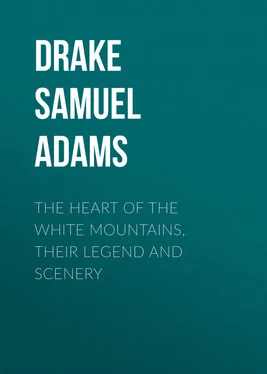“Dinner for one?” continued the eternal smoker.
“For three!” I exclaimed, out of all patience.
“For four; I shall eat double,” added the colonel.
“Six!” shouted George, seizing the dinner-bell on the mantel-piece.
“Stop,” said the man, betraying a little excitement; “don’t ring that bell.”
“Why not?” demanded George; “we want to see the landlord; and, by Jove,” brandishing the bell aloft, “see him we will!”
“He stands before you, gentlemen; and if you will have a little patience I will see what can be done.” So saying, he put his pipe on the chimney-piece, wiped his mouth with the back of his hand, and went out, muttering, as he did so. “The world was not made in a day.”
In three-quarters of an hour we sat down to a funereal repast, the bare recollection of which makes me ill, but which was enlivened by the following conversation:
“How many inhabitants are in your tract?” I asked of the man who waited on us.
“Do you mean inhabitants?”
“Certainly, I mean inhabitants.”
“Well, that’s not an easy one.”
“How so?”
“Because the same question not only puzzled the State Legislature, but made the attorney-general sick.”
We became attentive.
“Explain that, if you please,” said I.
“Why, just look at it: with only eight legal voters in the tract” (he called it track), “we cast five hundred ballots at the State election.”
“Five hundred ballots! then your voters must have sprung from the ground or from the rocks.”
“Pretty nearly so.”
“Actual men?”
“Actual men.”
“You are jesting.”
My man looked at me as if I had offered him an affront. The supposition was plainly inadmissible. He was completely innocent of the charge.
“You hear those men pounding away up the hill?” he demanded, jerking his thumb in the direction indicated.
“Yes.”
“Well, those are the five hundred voters. On election morning they came to the polling-place with a ballot in one hand, and a pick, a sledge, or a drill in the other. Our supervisor is a very honest, blunt sort of man: he refused their ballots on the spot.”
“Well?”
“Well, one of them had a can of nitro-glycerine and a coil of wire. He deposited his can in a corner, hitched on the wire, and was going out with his comrades, when the supervisor, feeling nervous, said,
Конец ознакомительного фрагмента.
Текст предоставлен ООО «ЛитРес».
Прочитайте эту книгу целиком, купив полную легальную версию на ЛитРес.
Безопасно оплатить книгу можно банковской картой Visa, MasterCard, Maestro, со счета мобильного телефона, с платежного терминала, в салоне МТС или Связной, через PayPal, WebMoney, Яндекс.Деньги, QIWI Кошелек, бонусными картами или другим удобным Вам способом.
So called from the fishing-weirs of the Indians. The Indian name was Aquedahtan. Here is the Endicott Rock, with an inscription made by Massachusetts surveyors in 1652.
No tradition attaches to the last three peaks. Passaconnaway was a great chieftain and conjurer of the Pennacooks. It is of him the poet Whittier writes:
Burned for him the drifted snow,
Bade through ice fresh lilies blow,
And the leaves of summer glow
Over winter’s wood.
This noted patriarch and necromancer, in whose arts not only the Indians but the English seemed to have put entire faith, after living to a great age, was, according to the tradition, translated to heaven from the summit of Mount Washington, after the manner of Elias, in a chariot of fire, surrounded by a tempest of flame. Wonnalancet was the son and successor of Passaconnaway. Paugus, an under chief of the Pigwackets, or Sokokis, killed in the battle with Lovewell, related in the next chapter.
Something has since been done by the Appalachian Club to render this part of the ascent less hazardous than it formerly was.
The Saco has since been bridged, and is traversed with all ease.
The sequel to this strange but true story is in keeping with the rest of its horrible details. Perpetually haunted by the ghost of his victim, the murderer became a prey to remorse. Life became insupportable. He felt that he was both shunned and abhorred. Gradually he fell into a decline, and within a few years from the time the deed was committed he died.
Dr. Jeremy Belknap relates that, on his journey through this region in 1784, he was besought by the superstitious villagers to lay the spirits which were still believed to haunt the fastnesses of the mountains.
This house stood just within the entrance to the Notch, from the north, or Fabyan side. It was for some time kept by Thomas J., one of the famous Crawfords. Travellers who are a good deal puzzled by the frequent recurrence of the name “Crawford’s” will recollect that the present hotel is now the only one in this valley bearing the name.
A portion of the slide touching the house, even moved it a little from its foundations before being stopped by the resistance it opposed to the progress of the débris.












